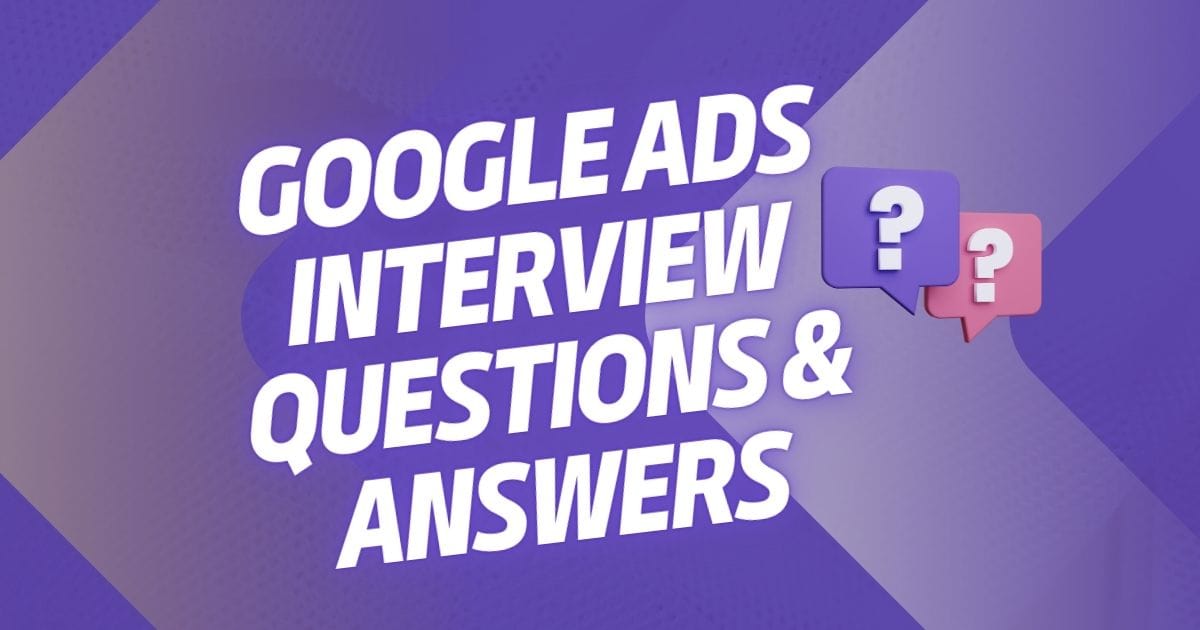Here are about Google Ads Interview Questions and answers that are tailored for recruiters and employees and cover extensive topics like the basics of Google ads, to advanced PPC strategies performance tracking and various other aspects. So, if you are someone looking forward to getting a job of a paid media manager, PPC analysts, or digital marketing experts, here are the list of questions and answers:
Businesses today rely increasingly on digital marketing and advertising to drive growth; naturally, companies offering these services need to deploy Google ad experts for planning, executing, and optimizing paid advertising campaigns. No wonder, the popularity of paid media marketing courses are at an all-time high. These courses equip candidates with extensive knowledge in campaign management, audience targeting, keyword strategy, and conversion optimization. Above all, the faculties prepare students to face interviews more courageously.
Why Preparing for Google Ads Interview Questions Matters
Whether you’re applying for a role as a PPC specialist, digital marketing executive, or performance marketer, Google Ads is likely a central part of the job. Interviewers often assess not just your theoretical knowledge but also how you handle real-world campaign scenarios. Being prepared with frequently asked Google Ads interview questions helps you:
Demonstrate hands-on experience and platform familiarity
Showcase problem-solving and analytical thinking
Stand out from other candidates with strategic insights
In short, preparation boosts your confidence and increases your chances of landing the role.
Benefits of Practicing Google Ads Interview Questions
Whether you’re a fresher or a seasoned marketer, preparing for Google Ads interview questions offers several key advantages. Here’s how it can give you a winning edge:
Boosts Confidence: Knowing what to expect helps reduce anxiety and allows you to present your skills clearly and confidently.
Demonstrates Expertise: Well-thought-out answers show that you not only understand the theory but can also apply it in real-world scenarios.
Improves Problem-Solving: Many interview questions are based on campaign challenges. Practicing them helps sharpen your ability to think analytically and strategically.
Highlights Updated Knowledge: Google Ads is always evolving. Being familiar with the latest updates, metrics, and tools helps show you’re staying current with industry trends.
Sets You Apart from Other Candidates: Many applicants rely on experience alone. Your preparedness will showcase your commitment and attention to detail—traits every employer values.
Top 24 Google Ads Interview Questions You Should Practice
Stepping into a digital marketing interview? Google Ads questions are almost guaranteed to come up. To help you get ahead, we’ve compiled the 24 most important questions interviewers love to ask, along with answers that will help you stand out.
1. What Do You Mean By Google Ads, And How Does It Work?
Google Ads is a platform meant for digital advertising that businesses create and use on search result pages. Advertisers also include relevant keywords to make sure that the ad reaches the targeted users. Adwords function under a bidding system and higher the price of the advertisement higher is the ranking. Companies using Ad Words pay only the quoted amount when people click on the advertisement.
2. Name Different Type of Google Ads Campaigns
There are different types of Google Ads campaigns to help businesses achieve their goals and objectives. Some of them are:
- Display
- Search
- Shopping
- Discovery
- App
- Video
- Performance Max campaigns
These campaigns are designed based on different users and their behaviors.
3. What Is PPC Marketing?
PPC marketing refers to pay-per-click marketing and is a strategy designed to drive traffic from websites and search engines to business websites. In this type of marketing, the advertiser needs to pay when someone clicks on the ad and hence the name is pay-per-click.
4. What Is Campaign Management?
Campaign management is the process of creating and managing advertisement campaigns for businesses on Google Ad Words. The person responsible for managing the campaign and ensure the best Return on Investment or ROI.
5. How Do You Set Up Conversion Tracking System On Google Ads?
When setting up conversion tracking on Google Ads, here are the steps:
- You need to click on the tools and settings in the menu
- The next step is choosing conversions
- You can create a new rate of conversion
- You must define the types, sources, and values of conversion
6. Why Is PPC Important For Online Advertising?
PPC is an important aspect of online advertising because the results show faster compared to organic campaigns that integrate SEO techniques. It is an excellent way of reaching the target customers and is useful in marketing various products that are otherwise difficult to find.
7. Why Is the Difference between Google Ad words And PPC Marketing?
The traffic that comes through Google Ad words is worth millions of users visiting a site. On the other hand, PPC is greatly focused on people who know what they are searching for and make the traffic worth the investment. This one is one of the most important Google Ads interview questions that every candidate needs to know.
8. What Are The Types Of Keyword Matches In Google Ads?
For hirers, figuring out how well the candidates are trained on Google ads expert tips for effectively targeting the advertisements and optimizing the campaigns. Here are the types of keywords matches on Google ads:
- Broad Match
- Phrase Match
- Exact Match
9. What is Ad Rank?
Ad Rank is the position at which a particular ad is positioned on the Google page and it is determined by the bid that is placed on the keyword related to the advertisement. It’s the quality score that determines the ad rank.
10. What is Quality Score?
Google usually rates ads based on the usage of keywords and the overall design of PPC ads. This rating is also called Quality Score and depends on the relevance of ad text, quality of the landing page, and the relevance of keywords. The higher the score better is the chances of it being present on the top of the list.
11. What Is Meant By Ad Extensions On Google Ads?
Ad Extensions is the additional information that revs up the appearance as well as the functionality of the ad like links, call buttons, and location details. With this extra information, the user interaction improves to a great extent. This one might be one of the questions of advanced Google ads interview that any candidate may face.
12. What Are Tips To Craft An Effective Ad Copy In Google Ads?
To create effective Google Ads copy, focus on highlighting your Unique Selling Proposition (USP)—what makes your product or service stand out. Keep the language concise and direct, emphasizing key benefits. Use strong calls to action (CTAs) like “Shop Now” or “Get a Quote” to encourage immediate engagement. Incorporate relevant keywords to improve ad relevance and Quality Score. A/B test different versions of headlines and descriptions to find what resonates best with your audience. Also, consider using numbers or statistics to add credibility. Creativity, clarity, and value are key to success.
13. Can Big Brands Implement PPC Marketing Campaign Only?
No, any business irrespective of size and operations can leverage the benefits of PPC. However, the most important aspect of this campaign is finding targeted and relevant keywords.
14. What Are The Different Types Of Targeting Strategies In Google Ads?
Google Ads offers targeting strategies like Display Network targeting (placement, topics), audience targeting (affinity, in-market, custom), content targeting (keywords, topics), remarketing (retargeting previous visitors), and geographic/language targeting. These options help refine your audience, ensuring ads reach the most relevant users.
15. What Is The Double-Serving Policy In Google Ad words?
The double-serving policy of Google Adwords state that no advertiser can use the same set of keywords over and over again through different accounts. Google has deigned this policy so that users do have to view the advertisement of the same company but stick to those used by different service providers.
16. How Do You Measure The Success Of Google Ads Campaign?
Another of the important Google Ads interview questions is how one can track the success of Google ads campaign. Some of the key metrics are CTR, Cost-Per-Click, and Return-on-Ad Spend or ROAS that help determine how effectively the advertisement attracts clicks and are eventually converted to desired actions.
17. What Are The Character Limits To Be Used In The PPC Ads?
A standard advertisement must not have more than 7 characters in the description and 25 characters in the title. An ad with an expanded text may have 30 characters in the first and second headlines and the description of the expanded text will have no more than 80 characters.
18. What Is A Converted Click?
A converted click refers to a click on your Google ad that leads to a successful conversion—such as a purchase, form submission, phone call, or any other action you’ve defined as valuable in your campaign goals.
In other words, it’s not just a click; it’s a click that resulted in the user completing a desired action.
For example, if a user clicks on your ad and then completes a purchase on your website, that’s considered a converted click. This metric helps advertisers measure how effectively their ads are driving real business results, not just traffic.
It’s worth noting that Google has transitioned from reporting “converted clicks” to “conversions” to give a more comprehensive view of conversion actions, especially when tracking multiple conversion types per user.
19. How to Target Locations in Google Ads?
Whenever you create location settings, you can use geographical areas, cities, and regions. The, you can customize the ads related to specific locations and targeting specific audiences when you leverage this idea and drive better ROI.
20. How to Create an Affective Landing Page for Google Ads?
An effective landing page is critical for converting ad clicks into actual results—whether it’s a lead, sale, or sign-up. Here’s how to ensure your landing page delivers:
Visually Appealing Design: Use clean, modern design with consistent branding, eye-catching visuals, and an intuitive layout. A professional appearance builds trust immediately.
Compelling Copy: The headline should grab attention and align closely with the ad copy. Keep the message clear, benefits-focused, and persuasive. Use short paragraphs, bullet points, and strong calls to action (CTAs).
Fast Load Time & Mobile Optimization: A slow or unresponsive page can drive visitors away. Ensure it loads quickly and looks great on all devices.
Data-Driven Enhancements: Use tools like heatmaps, A/B testing, and analytics to track user behavior and make informed improvements. Optimizing elements like CTA placement, form length, or color schemes can significantly boost conversion rates.
Trust Signals: Include testimonials, reviews, certifications, or trust badges to reduce hesitation and build credibility.
21. What Are Invalid Clicks?
An invalid click is one that is unintentional, fake, or may e caused due to malware. Google uses some algorithms and mechanisms to determine invalid clicks from any user account.
22. What Are The Two Most Important Factors That Determine Ad Position?
The position of your ad on Google’s search results page is influenced by several factors, but the two most critical ones are:
Cost Per Click (CPC): This is the maximum amount you’re willing to pay for a click on your ad. A higher CPC can increase your chances of securing a better ad position—especially when competing with other advertisers bidding on the same keywords.
Click-Through Rate (CTR): CTR reflects how often users click your ad after seeing it. A higher CTR signals to Google that your ad is relevant and engaging, which positively affects your Quality Score—a key component in determining ad rank.
Together, CPC and CTR contribute to your Ad Rank, which is what ultimately decides your ad’s placement on the search results page. So, even with a lower CPC, a high CTR can help you compete more effectively.
23. How Is the Return on Ad Spend (ROAS) Calculated?
ROAS, or Return on Ad Spend, is a key metric that measures the effectiveness of your advertising campaigns. It is calculated using the formula:
ROAS = Revenue Generated from Ads / Amount Spent on Ads
For example, if you spent $500 on a Google Ads campaign and generated $2,000 in revenue, your ROAS would be:
ROAS = 2000 / 500 = 4
This means that for every $1 spent on ads, you earned $4 in return.
A higher ROAS indicates a more profitable campaign. However, what counts as a “good” ROAS can vary depending on your business goals, profit margins, and industry benchmarks.
24. What Is The Impression Share Metric?
Impression share equals impressions divided by the total eligible impressions. Different factors are used to estimate impressions, including quality, approval, status, etc. The data is accessible to ad groups, campaigns, and product groups, for example, and can help you determine if it’s viable to increase your budget to reach more people.
Conclusion: Why You Can’t Afford to Ignore Social Listening
Here is some of the most important interview questions related to Google Ads. At Edu Minds, we train candidates for social media marketing course and help candidates brace the interviews courageously. If you want to advance your career for better in digital marketing, collaborate with the advanced certification courses of Edu Minds and be a leader right away.
Frequently Asked Questions (FAQs)
To measure success, track metrics like CTR (Click-Through Rate), conversion rate, and ROAS (Return on Ad Spend). If these numbers are consistently high, your campaign is likely performing well. Use Google Ads' reporting tools and analytics to monitor performance and adjust strategies for better results.
Focus on refining your ad copy, improving your landing pages, and using more targeted keywords. Implementing A/B testing for ads and using remarketing can also help increase conversion rates. Make sure to track all metrics and adjust based on real-time feedback.
The best bidding strategy depends on your goals. Manual CPC allows control over bids, while Enhanced CPC optimizes bids automatically. Target ROAS or Target CPA strategies are ideal if you focus on conversions. Evaluate your campaign goals and test different strategies for optimal results.
Start with keyword research using tools like Google Keyword Planner. Focus on keywords with a balance of high search volume and low competition. Don’t forget to use negative keywords to filter out irrelevant traffic and avoid wasting ad spend.
Quality Score directly affects your ad rank and CPC (cost-per-click). It's based on factors like CTR, ad relevance, and landing page experience. A higher Quality Score can lower your cost-per-click and improve your ad position, ultimately improving campaign performance.
Yes! You can run a successful campaign on a low budget by focusing on highly targeted keywords and specific geographic locations. Prioritize your best-performing ads and use cost-effective bidding strategies. Continuously optimize your campaigns to maximize ROI even on a smaller budget.
Related Posts

A Guide to Selecting an Advanced Digital Marketing Program for Career Advancement
When it comes to Digital Marketing Program, the mantra is…

5 Digital Marketing Power Skills That Will Dominate the Industry By 2026
Well, we are almost reaching the end of 2025 and…

Most Asked Questions for SEO interview
Prepare Like a Pro with the Best Digital Marketing Institutes…

